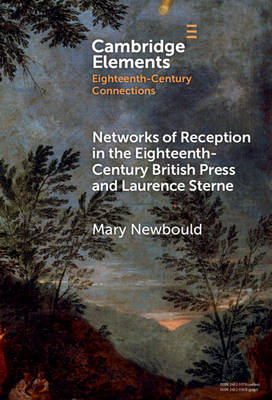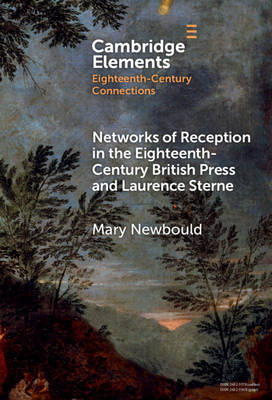
Bedankt voor het vertrouwen het afgelopen jaar! Om jou te bedanken bieden we GRATIS verzending (in België) aan op alles gedurende de hele maand januari.
- Afhalen na 1 uur in een winkel met voorraad
- In januari gratis thuislevering in België
- Ruim aanbod met 7 miljoen producten
Bedankt voor het vertrouwen het afgelopen jaar! Om jou te bedanken bieden we GRATIS verzending (in België) aan op alles gedurende de hele maand januari.
- Afhalen na 1 uur in een winkel met voorraad
- In januari gratis thuislevering in België
- Ruim aanbod met 7 miljoen producten
Zoeken
Networks of Reception in the Eighteenth-Century British Press and Laurence Sterne
Mary Newbould
€ 112,95
+ 225 punten
Uitvoering
Omschrijving
Criticism and creativity characterised literary reception in eighteenth-century Britain. The press - periodicals, newspapers, and magazines - harboured the reviewing cultures belonging to the emerging professionalisation of literary criticism. It also provided highly fertile ground for creativity, including imitative items inspired by new publications, while critical reviews often incorporated parody. The press fostered experimentation among often anonymous reader-contributors, even while it facilitated the establishment of 'classic' works by recirculating well-known authors' names. Laurence Sterne's reception was energetically shaped by the interaction between critical and creative responses: the press played a major role in forging his status as an 'inimitable' author of note.
Specificaties
Betrokkenen
- Auteur(s):
- Uitgeverij:
Inhoud
- Aantal bladzijden:
- 82
- Taal:
- Engels
- Reeks:
Eigenschappen
- Productcode (EAN):
- 9781009663199
- Verschijningsdatum:
- 13/11/2025
- Uitvoering:
- Hardcover
- Formaat:
- Genaaid
- Afmetingen:
- 152 mm x 229 mm
- Gewicht:
- 281 g

Alleen bij Standaard Boekhandel
+ 225 punten op je klantenkaart van Standaard Boekhandel
Beoordelingen
We publiceren alleen reviews die voldoen aan de voorwaarden voor reviews. Bekijk onze voorwaarden voor reviews.









